Get Your Dog Ready for Hunting Season
By Dr. Maria Krenz, DVM – ZimmVet-763-856-4848

Many people enjoy hunting as a hobby with their dogs. A little preparation can make the time fun for you and your dog.
Flea & Tick Prevention
Fall is peak time for transmission of lyme disease from adult ticks. Fall is also when many pets become infested with fleas. There are a variety of products on the market including topical and oral options. Talk to your veterinarian about what product is best for you pet.
Internal Parasites
Hunting dogs are at higher risk to contract roundworms and hookworms from the environment. These parasites can then be passed to people. Heartworm prevention, such as Interceptor®, deworms for these parasites and should be given once a month.
Vaccinations
Make sure your pet is current on vaccinations such as Rabies, Lyme and Leptospirosis. Hunting dogs are at increased risk of these easily preventable diseases. Also, if your dog is going to be hunting with a group of other dogs, its distemper combination, bordetella and influenza vaccinations should be up-to-date.
Exercise
Just like a person, if a dog is not properly conditioned before working hard, they can suffer from performance injuries such as pulled muscles, sore joints and strained or torn ligaments. Gradually increase your pet’s activity over a couple weeks prior to the start of hunting. In addition, be sure to allow your pet time to rest while hunting.
Food
Overweight pets are at an increased risk for performance injuries as well as exhaustion. Make sure your pet is an ideal weight prior to the start of hunting season. For pets that are more than a couple pounds overweight safe weight loss needs to be done gradually over many months. Contact your veterinarian to make a weight loss plan for your pet. During hunting, a dog’s calorie intake increased. Feeding small frequent meals can help your pet keep up to the demands of hunting.
Paws
Many dogs can wear down their paw pads and form painful ulcerations. Keep protective boots on hand for your dog to wear. Dogs can suffer from cuts and debris in their eyes, especially in grass and wooded areas. Keep an eye saline solution with you, along with some bandaging material to stop bleeding until you can get to your veterinarian. Your veterinarian can help you put together a first aid kit for your pet or you can purchase a premade kit.
Senior Hunters
Senior dogs can often remain active and healthy with the help of your veterinarian. Senior pets benefit from a daily glucosamine supplement such as Dasuquin. This supplement needs to be started at least a month prior to hunting if your dog is not taking it regularly year round. Senior dogs do well on pet pain medication started a day prior to the hunt and continued daily. The goal is to control the pain before it builds up. If your pet is already on a daily pain medication your veterinarian can prescribe additional medications to help during hunting. Contact your veterinarian to make a plan to keep your senior hunter comfortable.
Disclaimer: This written content is meant to be educational and is not medical advice. Always consult a veterinarian about medical advice for your pet.


